Nearly a month after Hamas's deadliest attack in decades, Israeli leaders have confirmed that a ground offensive in Gaza is in the works, and it's just a matter of when.
"Our actions will bring the war into their territory. We will defeat them on their own territory," said Yaron Finkelma, an officer in Israel's Southern Command.
HOW WOULD THE LANDING OPERATION LOOK LIKE?
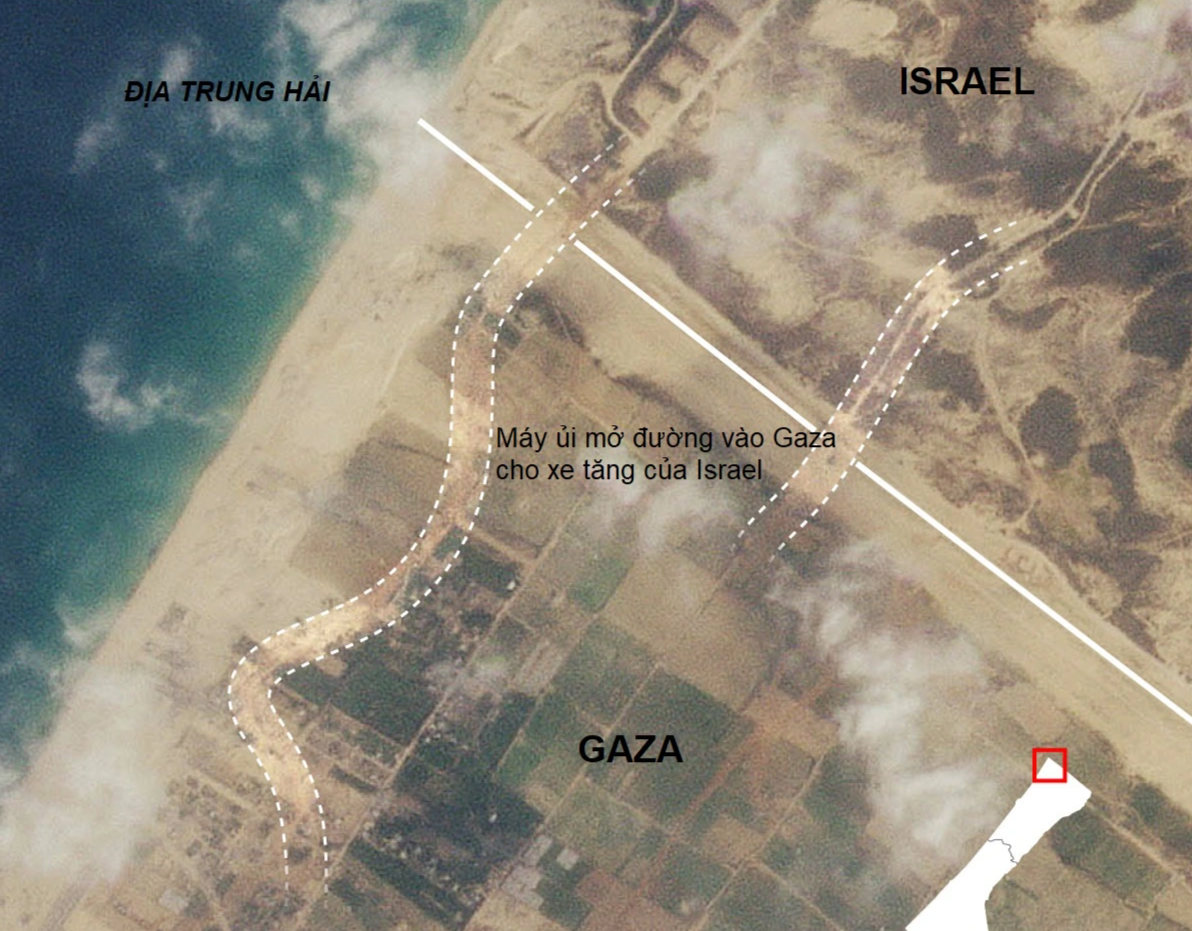
Satellite images show bulldozers clearing the way for Israeli tanks to enter Gaza during lightning raids on October 26 (Photo: New York Times).
Israel plans a three-phase campaign. The first phase will be intense air strikes, followed by a ground offensive to eliminate Hamas members and destroy their infrastructure in Gaza. In the next phase, Israel will seek to eliminate any remaining Hamas resistance. Finally, it will create a buffer zone around Gaza.
Over the past three weeks, Israel has launched its largest-ever air campaign against Gaza and begun carrying out lightning raids, a move that is believed to be aimed at paving the way for a large-scale ground offensive.
Israeli tanks and infantry stormed Gaza within hours and quickly retreated back to the border. There have been similar attacks in the past when Israeli troops have entered the Gaza Strip, but this time there were tanks. It was clearly preparation for the next phase of the war.
According to analysts, immediately after completing plans for the next campaigns, Israeli forces will be ready to organize a large-scale ground attack on the Gaza Strip.
Israel Defense Forces (IDF) Israel said that about 400,000 of its troops and hundreds of tanks are surrounding the Gaza Strip while the navy is carrying out a complete blockade to ensure that Hamas forces cannot receive arms and supplies by sea. In addition, Israel has also cut off the supply of electricity and water to this territory of more than 2 million people.
The only way for Israel to completely eliminate Hamas’ military capabilities is to conduct urban warfare, which means attacking every area and every corner of Gaza. To do that, Israel needs to mobilize both conventional and special forces to coordinate their actions in a systematic manner.
Given the size of the Gaza Strip, its fighting force and its arsenal, an Israeli operation could take months even with Israel's superior military capabilities.
"DOUBLE-EDGED SWORD"
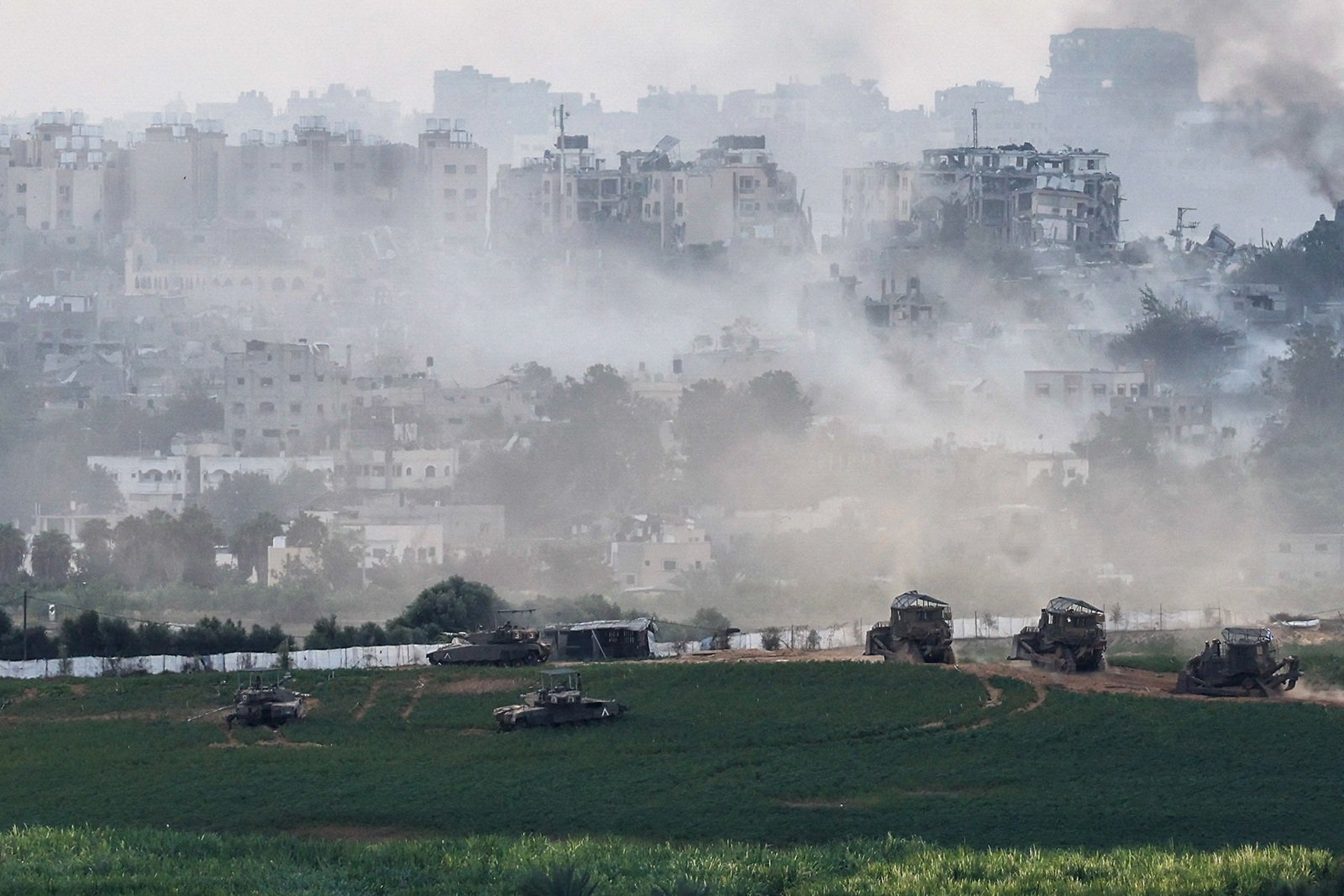
Israeli tanks operate inside Gaza on October 29 (Photo: Reuters).
Israeli officials believe that a ground offensive could help them completely resolve the threat from Hamas. However, this campaign also poses many potential risks for Israel.
As Israel continues to launch airstrikes and shells at targets in the Gaza Strip, its soldiers wonder: "Is this a trap?"
Hamas and its backers certainly anticipated Israel’s fierce response to the group’s rocket attack on October 7. According to analysts, Israel’s next steps will determine the situation in the Gaza Strip for decades to come.
In the Gaza Strip, the Israeli military knows that ground forces will face improvised explosive devices that can disable tanks, while military helicopters could be targeted by Hamas surface-to-air missiles.
As the attacker, Israel would also be at a disadvantage because of its urban warfare model. Gaza is a narrow strip of land with an area of over 360 square kilometers. Its capital, Gaza City, has about 700,000 people concentrated in about 50 square kilometers with many high-rise buildings.
In 2014, Israel lost 66 soldiers in fighting with Hamas forces. At that time, the Israeli army struggled to fight through urban warfare, tunnels, booby traps, ambushes and sniper fire across the Gaza Strip, despite the conflict lasting only a few weeks.
This time, with a record 360,000 reservists mobilized for a full-scale operation, much more time and resources will be needed to prepare, increasing the risk to the IDF's own combat forces.
Not to mention that Hamas forces also have significant support from underground tunnel systems that serve as shelters, weapons storage and military operations. This is certainly a major advantage of Hamas over Israel in the conflict.
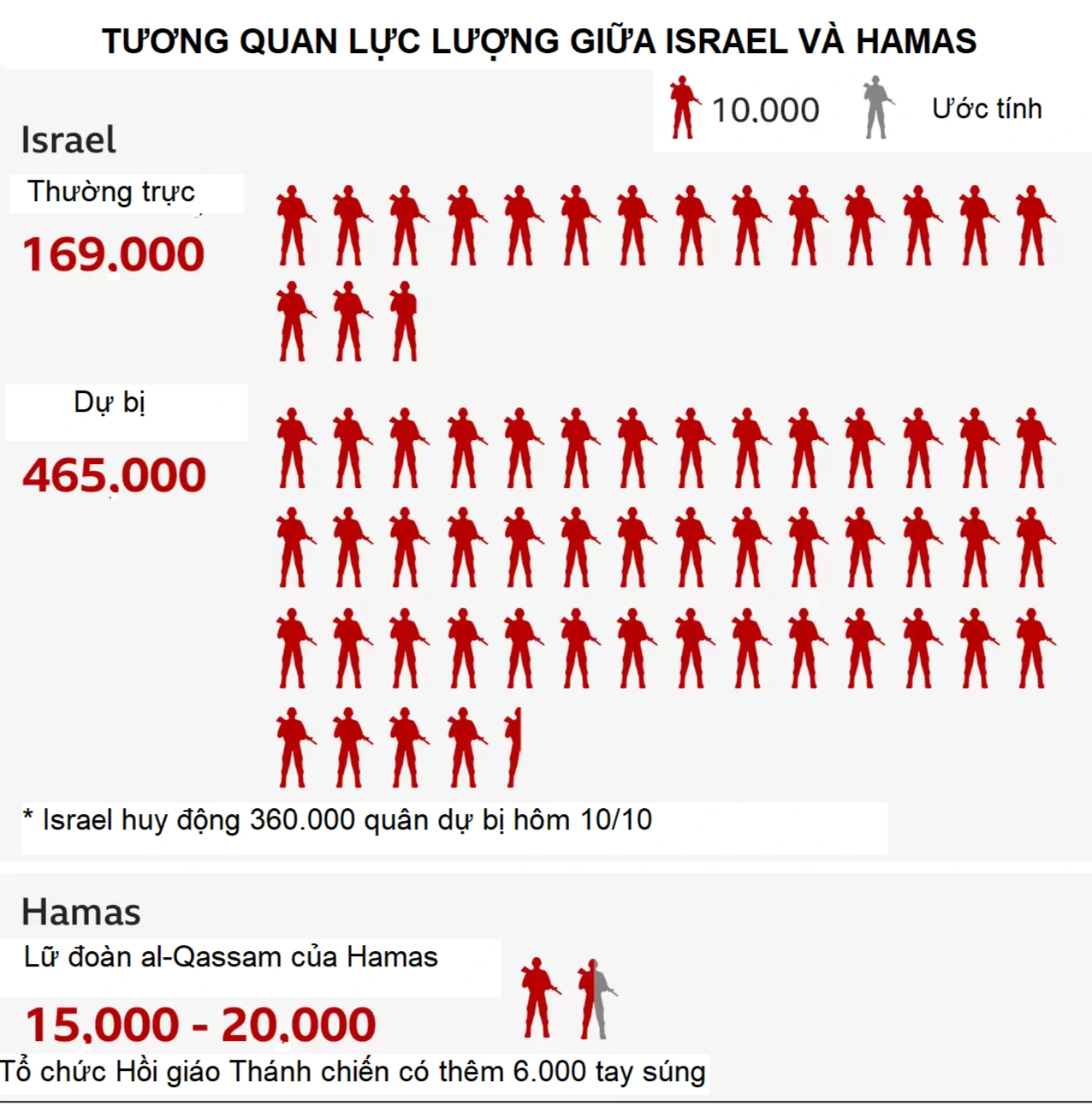
The balance of power between Israel and Hamas (Graphic: BBC).
Alp Sevimlisoy, a fellow at the Atlantic Council, said Israeli forces will have to carefully weigh the possibility of winning each small battle if they are to overcome the pitfalls and obstacles in Gaza.
"In the first phase, the IDF needs to gain control of each area until it controls at least 75%-80% geographically. This process will probably take several months," Sevimlisoy said.
In addition to the risk of military losses, Israel's ground offensive plan also risks the hostage rescue operation and causes large civilian casualties in the Gaza Strip.
Hamas is currently holding more than 200 hostages after a surprise attack on Israel on October 7, making the operation much more complicated.
To bolster rescue options, the US is said to have placed US Special Forces in a European country on high alert in case they are needed. Additionally, US Defense Secretary Lloyd Austin confirmed the presence of US military personnel on the scene to assist in intelligence sharing and planning for Israeli rescue operations.
A rescue operation in the Gaza Strip would be difficult without the certainty that the hostages would be concentrated in one location. Furthermore, carrying out a rescue by helicopter would be risky given the threat of fire from weapons such as grenade launchers or man-portable air defense systems.
This would limit the possibilities for rescue operations, both by land and sea. In addition, the lack of medical evacuation support and rapid response forces on the ground would make it difficult for Israel to carry out secret rescue operations for hostages in multiple locations across Gaza at the same time.
During the 2014 Gaza War, Israeli infantry battalions fought in northern Gaza, killing more than 1,600 people and injuring more than 10,000 in just over a month. Israel eventually withdrew without achieving any significant results.
Israel's upcoming ground offensive, if it materializes, could be even bloodier as Israel has vowed to eliminate Hamas. In a meeting with Israeli Prime Minister Benjamin Netanyahu, he pledged: "Israel will do its utmost to minimize civilian casualties."
However, a large-scale ground offensive would inevitably cause large civilian casualties in the Gaza Strip.
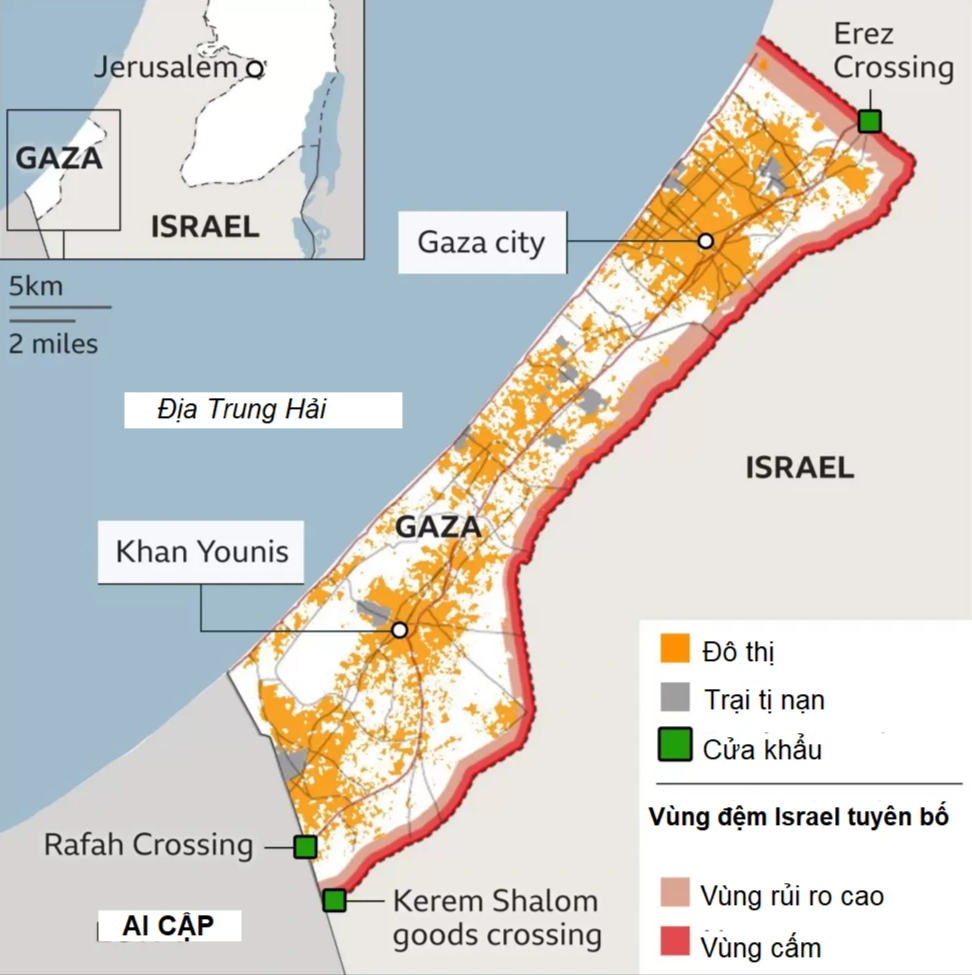
Urban warfare in Gaza would be difficult for Israel (Map: BBC).
David Cortright, professor emeritus at the University of Notre Dame’s School of Global Management, said the fighting in Gaza posed a major risk to Israel’s standing. He recommended that Israel “convene an international tribunal” to hold Hamas accountable and seek a separate political solution with the Palestinians.
"Israel's retaliation after Hamas attacks is understandable, but continuing the siege of Gaza will only cause more casualties and damage, and will escalate the conflict and only benefit Hamas," Cortright commented.
"At present, public sympathy and attention are shifting from the damage Israel suffered due to Hamas's attack to Gaza and the damage Gazans suffered due to Tel Aviv's retaliation. That is a trap that the Israeli army must avoid," he added.
The Israeli public is outraged that more than 1,400 people have died in the country since Hamas launched an attack and seized more than 200 hostages. That has fueled widespread support for an offensive in the Gaza Strip. But attitudes may change if the Israeli military suffers heavy casualties in a conflict that drags on without end.
A poll published by the Israeli daily Maariv on October 20 showed that 65% of people supported the ground operation, while 21% opposed it.
Bilal Saab, a Middle East and North Africa expert at Chatham House, the London-based Royal Institute of International Affairs, also warned that US support capabilities could also change over time.
According to Mr. Saab, Israel has the ability to destroy Hamas, but they need to "take into account the opinions of allies, threats from enemies and wavering public opinion at home." "All are important and very unpredictable," this expert analyzed.
Furthermore, Israel’s air and artillery strikes against Hamas in recent weeks have caused discontent among Arab countries. If Israel takes further steps in this military campaign, it could undermine diplomatic efforts to normalize relations between Israel and Saudi Arabia, and risk isolating Israel in the region.
If Israel launches a ground operation in Gaza, it will have to consider the risk of the conflict escalating into a regional war. Iran-backed Hezbollah could enter the fray with an arsenal of some 150,000 missiles capable of hitting Jerusalem and Tel Aviv at any time. These forces are not yet fully engaged, but that could change in the rapidly evolving conflict.
Since the October 7 attack, Israel and Hezbollah have been engaged in a constant battle along the northern border between Israel and Lebanon. This has been one of the top dangers for Israel in recent years, even threatening to erupt into all-out war.
Iranian officials have also repeatedly warned that they will take action if attacks on Gaza continue.
ISRAEL HAS DIFFICULTY ACHIEVEMENT
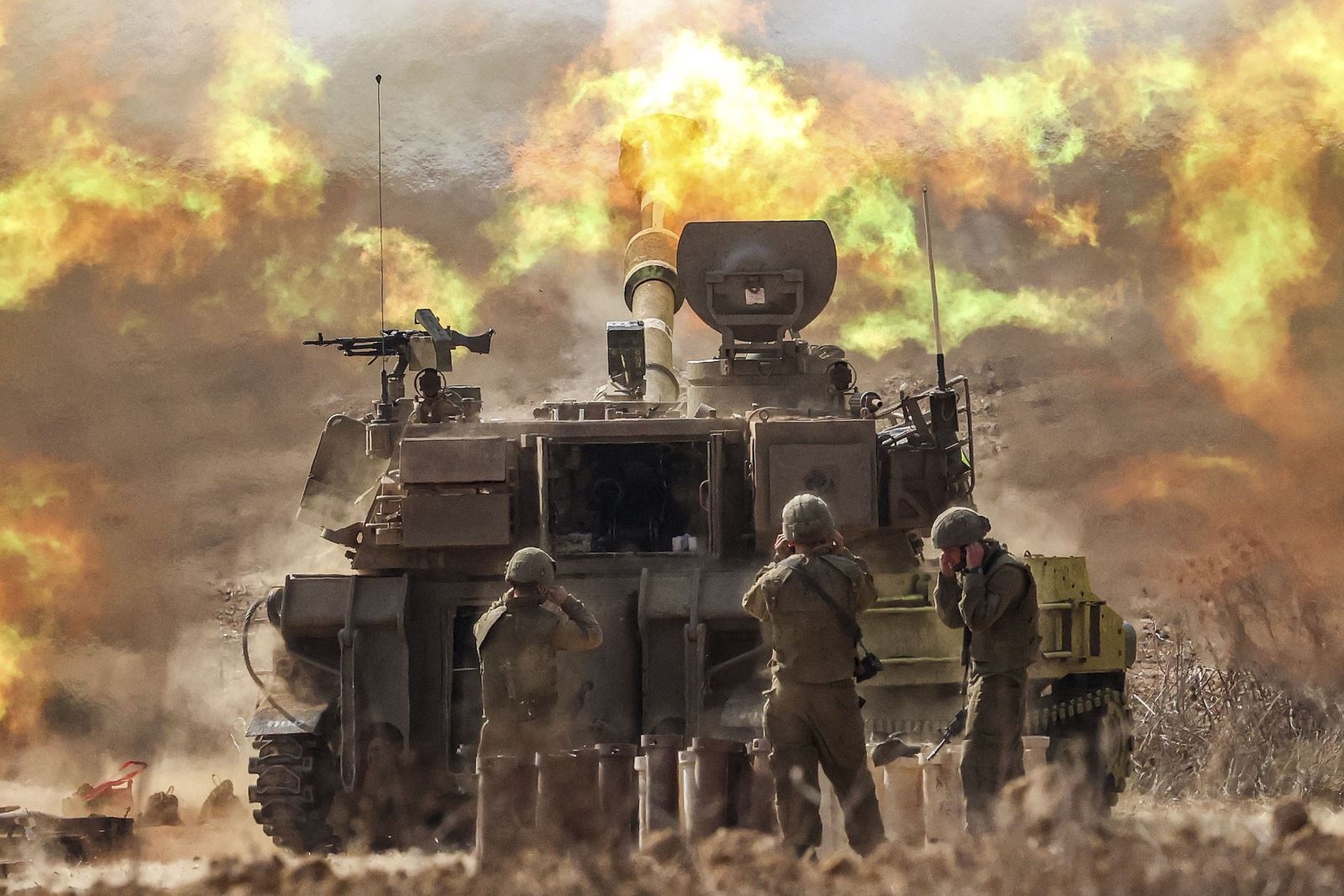
Israeli soldiers fire towards Gaza (Photo: AFP).
Israeli officials have repeatedly stated that they will definitely launch a ground offensive in Gaza with the goal of "wiping out" Hamas.
A day later, Israeli Prime Minister Benjamin Netanyahu also announced that he would continue to attack Hamas and emphasized that he would "crush and wipe out" this force.
However, analysts are skeptical about this plan of Israel.
“There is a common view among many that the complete elimination of Hamas would be catastrophic not only for Israel, but for the entire region and even the world,” said Harel Chorev, senior researcher at the Moshe Dayan Center for Middle East and African Studies at Tel Aviv University.
"That means (Israel) will have to destroy all Hamas-related infrastructure in Gaza, including the maze of tunnels that are likened to an underground city," the expert explained.
Hamas has built a complex, fortified tunnel system in Gaza to move and transport goods and weapons, as well as to set up command centers.
In addition to these infrastructures, to eliminate Hamas, Israel will also have to eliminate its leadership.
Hasan Alhasan, a Middle East policy expert at the Center for Strategic and International Studies (CSIS), said that the scenario of eliminating Hamas is extremely dangerous and complicated, and could lead to unpredictable consequences.
"Because Hamas is deeply rooted and attached to Gaza both geographically and socially, to defeat them, Israel will have to permanently change the terrain and demographics of the Gaza Strip," he said.
Observers say that the scenario of weakening Hamas seems more feasible for Israel. "I don't think Israel can eliminate all Hamas members, but they can weaken Hamas so that this force is no longer capable of fighting," said Amir Bar Shalom, an Israeli military analyst.
Meanwhile, Michael Milstein, head of the Palestine Studies Forum at Tel Aviv University, said that eliminating or weakening Hamas is not an easy goal. He explained that in addition to its army of more than 25,000 people, Hamas also has 80,000-90,000 members in civil organizations.
Former US General Robert Abrams also said that Israel would find it difficult to achieve its goal of eliminating Hamas while protecting Palestinian civilians. "I think the goal of completely defeating Hamas, eliminating all of its capabilities, while still being able to protect millions of Palestinians is almost impossible," he said.
Former commander of US forces in Korea Robert Adams stressed that one of the major challenges to Israel's goal is the complex urban terrain in Gaza.
"This will be a very difficult task for Israel. The Hamas defenses that will be deployed in the dense urban terrain of Gaza are unlike anything we have seen in recent years. That will require some siege warfare, while also trying to ensure that Israel does not accidentally target the hostages," the former US commander said.
Prime Minister Netanyahu, Defense Minister Gallant and other Israeli officials also acknowledged that a ground attack on Gaza would be a long and difficult campaign.
"The war in the Gaza Strip will be long and difficult and we are prepared for that," Netanyahu said, stressing that the retaliatory attack was just the beginning, and the ultimate goal would be to "destroy the enemy both on and below the ground."
According to Atlantic Council, CFR, Hill, Sputnik
Source



![[Photo] Prime Minister Pham Minh Chinh chairs the national online conference on combating smuggling, production and trade of counterfeit goods.](https://vphoto.vietnam.vn/thumb/1200x675/vietnam/resource/IMAGE/2025/6/23/4a682a11bb5c47d5ba84d8c5037df029)
![[Photo] Prime Minister Pham Minh Chinh holds meeting to launch exhibition of national achievements to celebrate 80th National Day](https://vphoto.vietnam.vn/thumb/1200x675/vietnam/resource/IMAGE/2025/6/23/0c0c37481bc64a9ab31b887dcff81e40)




















![[Photo] Party Congress of the Central Internal Affairs Commission for the 2025-2030 term](https://vphoto.vietnam.vn/thumb/1200x675/vietnam/resource/IMAGE/2025/6/23/5bf03821e6dd461d9ba2fd0c9a08037b)
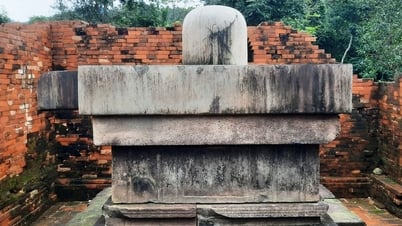



































































Comment (0)